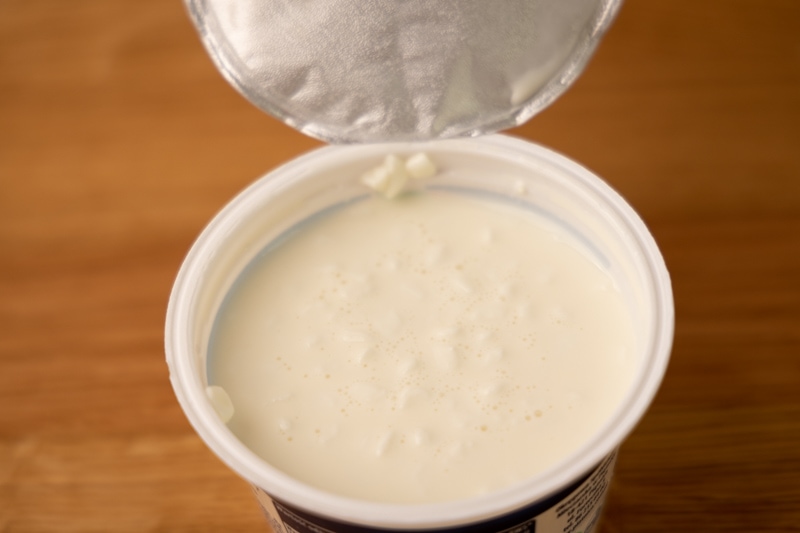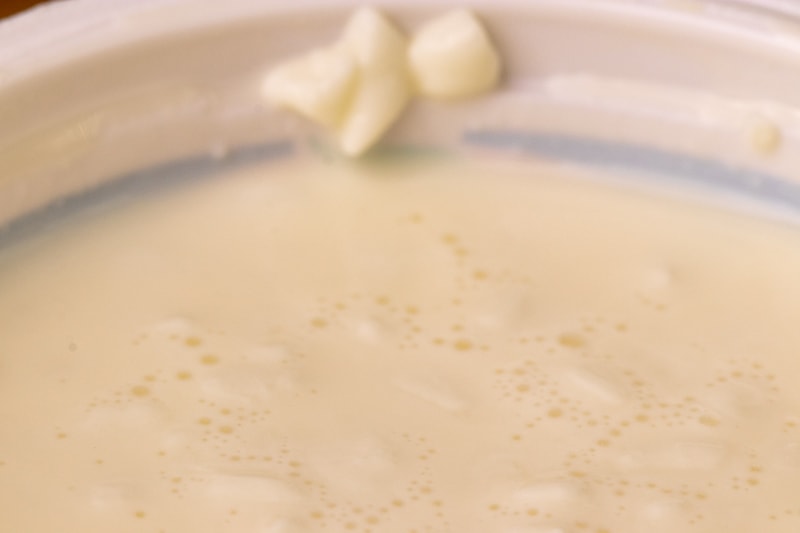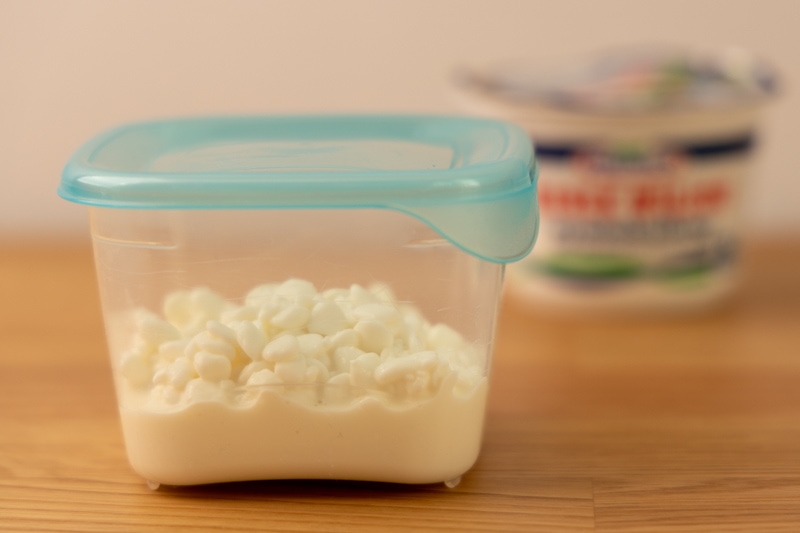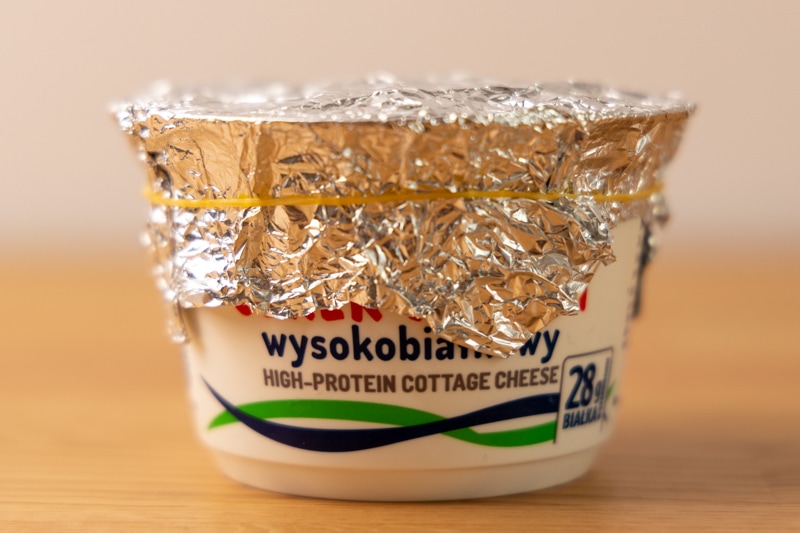What Can Happen to Cottage Cheese if Left Out Overnight
Cottage cheese comes with a shelf life of about two weeks and usually lasts for an extra 3 to 5 days past its "expiration" date.
Once you open it up, you get about 5 days to finish the dairy product. Maybe 7 days if you're lucky.
Besides that, no matter if your cottage cheese is past its date or not, you need to know the telltale signs of spoilage. Mold and a sour smell are the most popular ones, but there are others too.
Want to learn all about the storage, shelf life, and spoilage of cottage cheese?
If so, this article is for you. Read on.

How Long Does Cottage Cheese Last
| Fridge | |
|---|---|
| Cottage cheese (unopened) | Sell-by + 3 – 5 days |
| Cottage cheese (opened) | 5 – 7 days |
Unopened cottage cheese typically keeps for a couple of days after its sell-by (or best-before) date, and between 5 to 7 days once you open it. After a couple of days of storage, the separation will be more pronounced than it was when you first opened the container, and that's normal.
Cottage cheese usually comes with a sell-by date on the label. That date is a pretty good indicator of how long the dairy product should retain freshness, but it's not an expiration date and isn't about food safety.
Usually, cottage cheese should keep for a couple of days more after the date on the label, but that's about it.
Some cottage cheeses, especially the flavored ones (like my blueberry-flavored one you can see in my photos), have some preservatives added, and they often last a couple of days more, but that's more of an exception than a rule.

Once you open the cottage cheese, it can last for about a week in the fridge. Some producers even say that their cottage cheese stays fresh for up to 2 weeks, but I wouldn't count on that. I mean they make cottage cheese in single-serving-sized containers, not family-sized packages, for a reason.
Plus cottage cheese is a dairy product, and like other dairy products that aren't rich in fat (e.g. its cousin ricotta cheese), its quality deteriorates fairly quickly.

Does Cottage Cheese Go Bad? How to Tell If Cottage Cheese Is Bad?
Like all other dairy products, cottage cheese goes bad. When checking if your cottage cheese is bad or not, do the following:
- The sniff test. Sour cottage cheese is past its prime, and you probably should discard it. A sour smell (kind of like sour cream) doesn't necessarily mean it's unsafe to eat, but it sure won't taste as it used to. If it smells off or funny, discard it no matter what.
- Check the texture. If there's a layer of water on top, and the rest is super chunky (like it's almost solid), it's time for it to go. Small pockets of water are okay and expected.
- Look for mold or any other discoloration on the surface. Throw it out if you see any.
- Sits open for more than a week, or is more than a week past its date. If that's the case, let it go.
When it comes to texture, some separation is fine (i.e., the cottage cheese is a bit watery), and you can fix that by stirring the solids and liquids together. But if the whole thing separated, that cottage cheese is spoiled.
If everything seems to be okay, give it a taste and decide based on that if it's good enough to eat.

How to Store Cottage Cheese
Store cottage cheese in the fridge, possibly in the far corner instead of the fridge door. Once you open the container, make sure you seal tightly any leftovers and place them back in the refrigerator as soon as possible.
Like almost any other dairy product (e.g., string cheese or cream cheese) you should store cottage cheese in the fridge.
To keep the freshness of this dairy treat for longest, let it sit in the far corner of the refrigerator. The fridge door is where the temperature changes often, so that's not a good place for cottage cheese.

Once you open the package, make sure you close it tightly before you put it back into the fridge.
Since most cottage cheeses come in plastic containers that aren't resealable, you need to come up with another solution. Transferring the dairy product into an airtight container or the original package into a freezer bag are two environment-friendly options.
If you don't have either on hand, plastic wrap or aluminum foil and a rubber band will do the trick too.

If you plan on consuming or using the rest of the cheese within a day, you can leave it in its original packaging. But that will work only if you don't have any foods with a strong aroma in your fridge.
Warning
Cottage cheese easily picks up odors, and you definitely don't want to eat cottage cheese that smells like sausage.
Here's how you can store opened cottage cheese:
Can You Freeze Cottage Cheese?
Like with many other dairy products, e.g., buttermilk or kefir, freezing is a possibility, but it comes at a cost.
Cottage cheese tends to separate and become watery after thawing. That's why producers recommend that you shouldn't freeze cottage cheese.
Sure, some of that separation can be fixed by stirring the product, but the resulting texture won't be anywhere near the original one. Because of that, frozen cottage cheese works only in sauces, casseroles, soups, and other cooked dishes.
If you'd like to read more about freezing this dairy product, I wrote an article that details the process of freezing cottage cheese. I also have a guide on freezing ricotta, which freezes noticeably better than cottage cheese.

FAQs about Cottage Cheese
Below you can find a couple of extra questions related to cottage cheese that I didn't answer directly above.
How long can cottage cheese sit out?
Cottage cheese can sit at room temperature for up to two hours. If it's out for longer than that (e.g., it was accidentally left out overnight), discard it. For food safety and best quality, keep your cottage cheese refrigerated at all times.
Can you eat expired cottage cheese?
Yes, as long as it doesn't show any signs of spoilage and you kept it refrigerated the whole time. Also, make sure it's only a week, maybe a week and a half, past its date. If it's older than that, I recommend you toss it out.
How long is cottage cheese good for after the expiration date?
There isn't an exact period, but a week to maybe a week and a half is a good estimate. Of course, some cottage cheeses (e.g., flavored ones) usually keep for longer than others.
If the date doesn't scare you, open it up and see what's inside. If there aren't any clear signs of spoilage, and the quality seems to be good enough, feel free to eat it.
What Can Happen to Cottage Cheese if Left Out Overnight
Source: https://www.doesitgobad.com/does-cottage-cheese-go-bad/